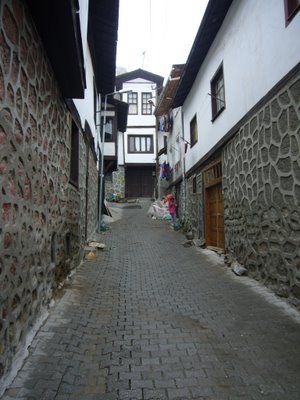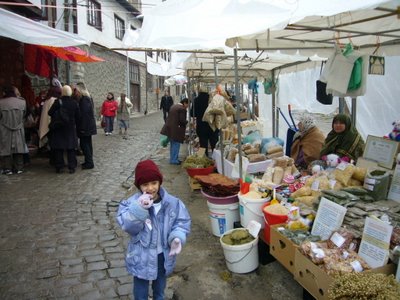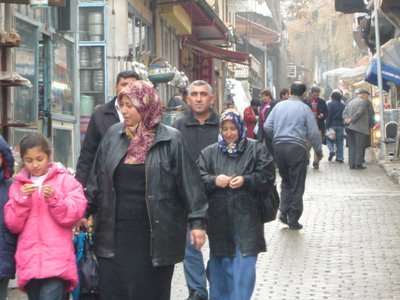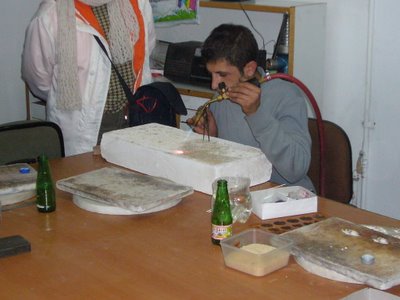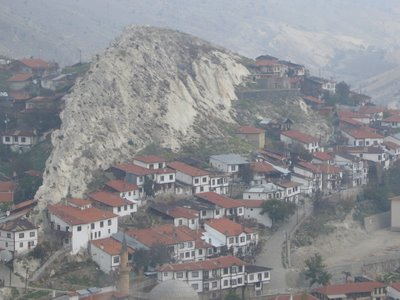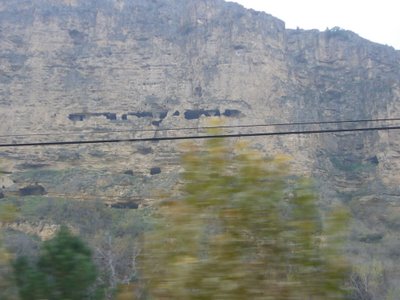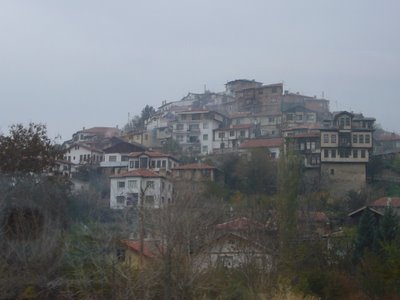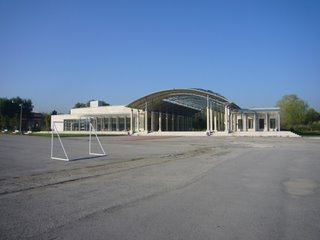Wednesday, November 29, 2006
Here is a 80+ page power point presentation I created for when I return. It's just in draft form (yes, I see all the spelling mistakes, and will fix them), and I know the most incomplete parts are the teaching strategies, etc. But the pictures are quite useful.
You can also give me your feedback on how it can be improved, since I plan on sharing it with my school upon my return. Thanks.
Note - depending on your computer, it may not work (sorry).
http://www.odtugvo.k12.tr/den/TurkishEducation.ppt
You can also give me your feedback on how it can be improved, since I plan on sharing it with my school upon my return. Thanks.
Note - depending on your computer, it may not work (sorry).
http://www.odtugvo.k12.tr/den/TurkishEducation.ppt
Monday, November 27, 2006
Here's an except from a letter Silvia recently wrote:
"It took six trips from August to November to Ankara Police Headquarters and 2000 YTL (which we still haven’t been reimbursed) to get our residence permits. When I told Michael he should write a blog on this endless process, he said it was too frustrating to write about and he didn’t want to jinx it at this point, since we’re not really sure if the permits we finally got are enough to legitimize our stay and his work. You see, we finagled our way into getting tourist permits and even had to sign that within a certain amount of time we would apply for and get work permits, although Michael is not earning any Turkish lira (YTL) here. (He’s getting paid his US salary in the US...) In total to date, we’ve had to front about US$4000 for expenses for which we eventually get reimbursed, as in this case we hope to do, but the uncertainty of putting one’s limited finances on the (slow bureaucratic) line, no interest earned, of course, is a high risk financial investment. The only, yet abundant, returns are the experiences of a year in this country, almost high yield, one could argue. But definitely not financial.
This story began a few days after Michael arrived in Turkey early August and one of his ever-helpful colleagues took him by Police Headquarters to get the permits. Back then we used to talk in such absolute terms: get, do, finish. Now we know better. We say, “start the process, begin getting, or see what we need to do.” The Police bureaucrats gave him forms, to fill out in duplicates and return with 5 pictures each and about 2000 YTL, cash only, no credit card. In shock at having to pay this large fee (so soon after spending the NON-reimbursable 300USD on Visas and 6000USD on airfare for his family), Michael telephoned the Fulbright Ankara office to see what could be done on the permit costs. “I’ll look into it,” the person responsible said. He never heard from her again on the permit subject, that month or the next, and all the while fretted as he slowly withdrew YTL fund from his US account through an ATM as his salary account balance permitted.
At a Turkey Fulbrighters Orientation Program on Sept. 28, he received a handout entitled “Reimbursements” for Fulbrighters. Below the two categories Tuition and Housing (a grad student category which doesn’t apply to us) and Turkish Language Instruction (which we haven’t been able to schedule yet and have not received a reply as to whether or not it is spouse transferable) is the category that both relieved yet angered Michael: Residence Permit. It reads: “All grantees and family members may be reimbursed for the cost of their Residence Permit, but not for Visas.” We both wondered why we were not informed of this sooner, as there is a one to three month deadline (depending on the source) from the moment on enters the country for obtaining the permits without a fine being added for delinquency.
Looking at the reimbursement quote again, now more carefully after the initial mixed anger and relief, the words “may be” as in “may be reimbursed” concern me; so do “their Residence Permit” in the singular, which could be interpreted to our disadvantage as only one per family or not both tourist and work permits, as we may be required to obtain. Oh well, with five blue residence permit booklets in hand, looking much like our passports, one feels a certain safety and security, a legitimacy only a bureaucracy can give one with signed, sealed, far-dated (valid until October 2007!), laminated, photographed, and completely in Turkish (i.e. not understandable to us) documentation.
But back then, upon reading the reimbursement policy quote pertaining to Residence Permits for Fulbright grantees and their families, we were angry that no one at either office had told us this before, that we were left to handle the money and the bureaucracy by ourselves (good thing for the untiring help of Michael’s colleagues), yet relieved that it might be that easy. Alas, even reimbursement is a process to start, since our ATM withdrawals in August, to our attempted applying and paying in August, Sept, and Oct, to our receipt and cover letter submittal in mid October, to being told we need to physically show our issued permits in late Oct, to getting the permits in early November, to scheduling a visit to the office to prove we have the permits, to currently awaiting confirmation that the reimbursement is ready for disbursement to the grantee Michael. And then we can only hope we’re fully reimbursed for all of our costs, minus psychological and emotional tolls, since we cannot get receipts for those.
Yet even our submitted cost in that mid Oct cover letter do not account for the accumulated transportation costs of six round trips to Police Headquarters and then to the Fulbright office (mostly by bus to minimize our cash outlay costs, hence very time consuming—Can get a receipt for that?), do not account for e communication costs (among landlines and cell phones and translators, between us and police and office and school, you do the permutations of possibilities), and definitely do no account for the cost of frustration. Like the first time when Michael was told he needed to complete the application for residence permit form in duplicate, we spent hours filling out a detailed form listing all the ID info for all five family members on each of the five forms, one for each person, twice. Do you get what that means?! It means on Michael’s form, for example, not only is all his ID info required, but so is it for each of the four accompanying members of his family, cross-referenced on his form so to speak, as well as on all of the other four forms, one for each other person; then hand-duplicate them all again. It is no wonder I did not memorize everyone’s visa and passport number, place and date of issue; luckily for me one already has in RAM everyone’s birthdate, place, social security number, parents’ maiden names and their birthplaces, as well as all the relevant permanent, local, temporary, and work/school addresses and telephone numbers/fax and emails. In the end, well past 1am, I just availed myself of power of attorney to sign off on all ten forms, all with the exact same information in different order, to be done with them all (only to wonder if they needed to be signed in the presence of a policeperson or some notary-like person with a seal). Then the Police took only one fully-filled form for each person, and told us to keep the other, maybe as a souvenir.
Same with the other fluctuating requirements, which always made us err on the side of excesses in case more was needed. Got the five photo of each person, actually purchased 7 just in case, then they only took three. Cash they took no problem, but official-looking receipts were impossible to get. So along with that cover letter we submitted the scraps of paper with numbers the police attendants scribbled and multiplied times 5, for applying, for the permits, for the photocopies, for the very file folders the Police filed our records in, and for the permit mug shots.
So many inconsistencies, changes of policy or procedures from one attendant to the next, from one telephone conversation to the next, from before lunch to after lunch. You the family head may apply alone. You cannot apply alone; bring your wife and children. We all go. Tamam (OK), the wife signs here and needs not return. Next time: Your wife need to come again and bring your marriage certificate. Tamam, yes, that’s the copy we awaited. Meanwhile, a translator/mediator calls before each attempted trip: what do they still need to bring, how much or many, who needs to come? And there’s always the incalculable risk of finding long lines at the Police, everyone like us foreigners trying to stay legally. And sane.
If we’re lucky and persistent, we may see that reimbursement before December, or it might be safer to say by December or this year, or heck, just make it all-inclusively vague: within the school year or our stay in Turkey. Hope that doesn’t jinx anything, anyway, anywhere.
Signing off,
Your Turkish resident,
Permit Number 889374
(or is it No. 1-166972?),
Silvia"
"It took six trips from August to November to Ankara Police Headquarters and 2000 YTL (which we still haven’t been reimbursed) to get our residence permits. When I told Michael he should write a blog on this endless process, he said it was too frustrating to write about and he didn’t want to jinx it at this point, since we’re not really sure if the permits we finally got are enough to legitimize our stay and his work. You see, we finagled our way into getting tourist permits and even had to sign that within a certain amount of time we would apply for and get work permits, although Michael is not earning any Turkish lira (YTL) here. (He’s getting paid his US salary in the US...) In total to date, we’ve had to front about US$4000 for expenses for which we eventually get reimbursed, as in this case we hope to do, but the uncertainty of putting one’s limited finances on the (slow bureaucratic) line, no interest earned, of course, is a high risk financial investment. The only, yet abundant, returns are the experiences of a year in this country, almost high yield, one could argue. But definitely not financial.
This story began a few days after Michael arrived in Turkey early August and one of his ever-helpful colleagues took him by Police Headquarters to get the permits. Back then we used to talk in such absolute terms: get, do, finish. Now we know better. We say, “start the process, begin getting, or see what we need to do.” The Police bureaucrats gave him forms, to fill out in duplicates and return with 5 pictures each and about 2000 YTL, cash only, no credit card. In shock at having to pay this large fee (so soon after spending the NON-reimbursable 300USD on Visas and 6000USD on airfare for his family), Michael telephoned the Fulbright Ankara office to see what could be done on the permit costs. “I’ll look into it,” the person responsible said. He never heard from her again on the permit subject, that month or the next, and all the while fretted as he slowly withdrew YTL fund from his US account through an ATM as his salary account balance permitted.
At a Turkey Fulbrighters Orientation Program on Sept. 28, he received a handout entitled “Reimbursements” for Fulbrighters. Below the two categories Tuition and Housing (a grad student category which doesn’t apply to us) and Turkish Language Instruction (which we haven’t been able to schedule yet and have not received a reply as to whether or not it is spouse transferable) is the category that both relieved yet angered Michael: Residence Permit. It reads: “All grantees and family members may be reimbursed for the cost of their Residence Permit, but not for Visas.” We both wondered why we were not informed of this sooner, as there is a one to three month deadline (depending on the source) from the moment on enters the country for obtaining the permits without a fine being added for delinquency.
Looking at the reimbursement quote again, now more carefully after the initial mixed anger and relief, the words “may be” as in “may be reimbursed” concern me; so do “their Residence Permit” in the singular, which could be interpreted to our disadvantage as only one per family or not both tourist and work permits, as we may be required to obtain. Oh well, with five blue residence permit booklets in hand, looking much like our passports, one feels a certain safety and security, a legitimacy only a bureaucracy can give one with signed, sealed, far-dated (valid until October 2007!), laminated, photographed, and completely in Turkish (i.e. not understandable to us) documentation.
But back then, upon reading the reimbursement policy quote pertaining to Residence Permits for Fulbright grantees and their families, we were angry that no one at either office had told us this before, that we were left to handle the money and the bureaucracy by ourselves (good thing for the untiring help of Michael’s colleagues), yet relieved that it might be that easy. Alas, even reimbursement is a process to start, since our ATM withdrawals in August, to our attempted applying and paying in August, Sept, and Oct, to our receipt and cover letter submittal in mid October, to being told we need to physically show our issued permits in late Oct, to getting the permits in early November, to scheduling a visit to the office to prove we have the permits, to currently awaiting confirmation that the reimbursement is ready for disbursement to the grantee Michael. And then we can only hope we’re fully reimbursed for all of our costs, minus psychological and emotional tolls, since we cannot get receipts for those.
Yet even our submitted cost in that mid Oct cover letter do not account for the accumulated transportation costs of six round trips to Police Headquarters and then to the Fulbright office (mostly by bus to minimize our cash outlay costs, hence very time consuming—Can get a receipt for that?), do not account for e communication costs (among landlines and cell phones and translators, between us and police and office and school, you do the permutations of possibilities), and definitely do no account for the cost of frustration. Like the first time when Michael was told he needed to complete the application for residence permit form in duplicate, we spent hours filling out a detailed form listing all the ID info for all five family members on each of the five forms, one for each person, twice. Do you get what that means?! It means on Michael’s form, for example, not only is all his ID info required, but so is it for each of the four accompanying members of his family, cross-referenced on his form so to speak, as well as on all of the other four forms, one for each other person; then hand-duplicate them all again. It is no wonder I did not memorize everyone’s visa and passport number, place and date of issue; luckily for me one already has in RAM everyone’s birthdate, place, social security number, parents’ maiden names and their birthplaces, as well as all the relevant permanent, local, temporary, and work/school addresses and telephone numbers/fax and emails. In the end, well past 1am, I just availed myself of power of attorney to sign off on all ten forms, all with the exact same information in different order, to be done with them all (only to wonder if they needed to be signed in the presence of a policeperson or some notary-like person with a seal). Then the Police took only one fully-filled form for each person, and told us to keep the other, maybe as a souvenir.
Same with the other fluctuating requirements, which always made us err on the side of excesses in case more was needed. Got the five photo of each person, actually purchased 7 just in case, then they only took three. Cash they took no problem, but official-looking receipts were impossible to get. So along with that cover letter we submitted the scraps of paper with numbers the police attendants scribbled and multiplied times 5, for applying, for the permits, for the photocopies, for the very file folders the Police filed our records in, and for the permit mug shots.
So many inconsistencies, changes of policy or procedures from one attendant to the next, from one telephone conversation to the next, from before lunch to after lunch. You the family head may apply alone. You cannot apply alone; bring your wife and children. We all go. Tamam (OK), the wife signs here and needs not return. Next time: Your wife need to come again and bring your marriage certificate. Tamam, yes, that’s the copy we awaited. Meanwhile, a translator/mediator calls before each attempted trip: what do they still need to bring, how much or many, who needs to come? And there’s always the incalculable risk of finding long lines at the Police, everyone like us foreigners trying to stay legally. And sane.
If we’re lucky and persistent, we may see that reimbursement before December, or it might be safer to say by December or this year, or heck, just make it all-inclusively vague: within the school year or our stay in Turkey. Hope that doesn’t jinx anything, anyway, anywhere.
Signing off,
Your Turkish resident,
Permit Number 889374
(or is it No. 1-166972?),
Silvia"
Tuesday, November 14, 2006
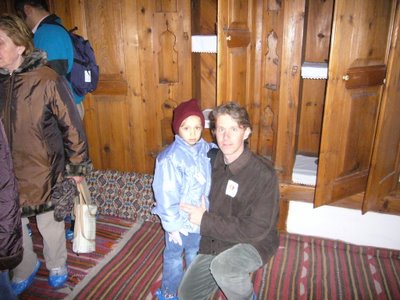
Elli Sol and Papa in an Ottoman house/museum. The flooring was wall-to-wall carpeting, due to overlapping oriental-style rugs.
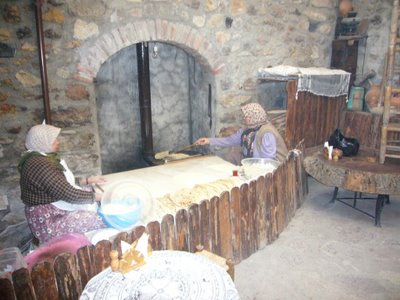 Nothing like cooking with a friend to make the time go by faster. Though this is for the tourists, we've seen cooking done at other places this way.
Nothing like cooking with a friend to make the time go by faster. Though this is for the tourists, we've seen cooking done at other places this way.Monday, November 13, 2006
On Saturday I took a day-trip with Elli Sol to Beypazari, a quaint town about 1 1/2 hours from Ankara. I signed up through the University travel guide (they run 3-4 trips a month), and was told that I'd probably be the only male, since the bus would be full of women going to buy jewelry, but I wanted to see a little of Turkey anyway.
Elli Sol and I took two dolmuses early Saturday to get to the university on time. The bus was only half full, and we met a woman originally from Cincinnati (30 years in Turkey!) and her husband, the head of the foreign languages school at ODTU. There were two other men on the bus too, so I didn't feel so out of place. Fifteen miles out of Ankara, however, we stopped under a highway underpass and 20 middle-aged ladies climbed on the bus, all headed for Beypazari's jewerly markets.
Our trip took us through strange terrain, a kind of Turkish Badlands full of sandy mesas and huge desolate valleys. We passed through a few cities and towns, but generally the landscape was barren of people - after the congestion of Ankara it was nice to see just open space. The area we were headed to is an agricultural area, and we saw sheepherders and their flocks, and fields that still retained miles of raised concrete culverts that brought necessary water. The only other people were very small pockets of field workers, and it looked like slow, backbreaking work.
Before entering the town of Beypazari, we traveled through a narrow gully that was hemmed in by two-hundred yard walls on each side. Dug into the walls were the remains of caves that had been used as living quarters in the very distant past. We also visited a sparkling mineral water bottling plant, complete with free samples (the buying began immediately - my fellow passengers bought about 20 cases of the water, and quickly stowed it under the bus, where I imagine it would get quite shaken up as we drove on the rest of the day).
Then it was onto to Beypazari itself, which reatins about 300 of the Ottoman houses that used to exist in parts of Turkey. These are not all concrete or adobe, but have wood frames, and each story is a little larger than the preceeding one. They kind of have the look of a Swiss chalet. The bottom floor was for the livestock, etc., and was made of stone, and the second and third (and fourth sometimes) were were the living and sleeping took place. We went inside one, converted into a museum, and it had a nice wood interior (though the woodwork didn't compare to old Norwegian homes I've seen). One interesting facet was the ornate cupboard toilet, which allowed one to stay in their living room and take care of business rather than go outside.
As we walked, we saw some of the local products - homemade noodles (hard) sold in large bags, crispy rolls (but when fresh out of the oven, as they were from some shops), and a type of candied carrot/Turkish delight, that is very tasty (I bought some rolled around walnuts for home).
We had a nice lunch in another converted home; the place we went is known for their sarma, which is a bit of rice and beef rolled very tightly in grape leaves. At lunch I sat with the Cincinnati couple, and another couple WHO HAD LIVED ON THE SAME STREET AS US IN ALBANY! Talk about a small world. Keren (the husband) is Turkish, and had worked for the New York State School Board's Association as a researcher; his wife Gloria was originally from Guatamala. They have lived in other countries as well, including a long stint in Saudi Arabia, and have now retired to a little community just outside one of the University gates. We have plans to meet this Saturday (Silvia and the kids can practice their Spanish), and we can talk about how this world may be too small.
After lunch, it was on to a jewelry area, with many small shops selling filigree (sp?) silver. There was one beautiful box, with the finest spirals of silver making up designs, about the size of my hand. I asked how much, and the proprietor weighed it to determine the price (it is silver, after all). It was about $200 U.S. dollars (and probably well worth it). Everywhere we went, they weighed the items to determine the prices (the craftsmanship must be factored in somehow). We also were invited in to see three men in a back room making jewelry. They had tiny torches and tools, and worked on small stone slabs.
After an hour of "shopping," we went to see some different crafts being made. First we went into a textile factory, which consisted of about 10 sewing machines and weaving machines apparatus, where women were working making small handbags and linen cloths. In the same building there were large looms where carpets were being made by hand. On the floor below, there were several tables of jewelry craftsmen/women, and there I found the cheapest silver goods (and of course bought some - I got Elli Sol and Mara fine-spun silver lockets and silver chains for about $5 each. Next door we were shown how the textiles were dyed (with colors made from various plants and flowers).
The day ended with some free-time in the town, and then a ride home in the dark (Elli Sol slept, and then said "That was quick," not believing she slept). Back to the highway underpass, 20 women unloaded bags of items and cases of mineral water, and then back to the university, where Elli Sol and I took two dolmuses to get home. A great day, and I hope to take advantage of the university service to see more of Turkey.
Elli Sol and I took two dolmuses early Saturday to get to the university on time. The bus was only half full, and we met a woman originally from Cincinnati (30 years in Turkey!) and her husband, the head of the foreign languages school at ODTU. There were two other men on the bus too, so I didn't feel so out of place. Fifteen miles out of Ankara, however, we stopped under a highway underpass and 20 middle-aged ladies climbed on the bus, all headed for Beypazari's jewerly markets.
Our trip took us through strange terrain, a kind of Turkish Badlands full of sandy mesas and huge desolate valleys. We passed through a few cities and towns, but generally the landscape was barren of people - after the congestion of Ankara it was nice to see just open space. The area we were headed to is an agricultural area, and we saw sheepherders and their flocks, and fields that still retained miles of raised concrete culverts that brought necessary water. The only other people were very small pockets of field workers, and it looked like slow, backbreaking work.
Before entering the town of Beypazari, we traveled through a narrow gully that was hemmed in by two-hundred yard walls on each side. Dug into the walls were the remains of caves that had been used as living quarters in the very distant past. We also visited a sparkling mineral water bottling plant, complete with free samples (the buying began immediately - my fellow passengers bought about 20 cases of the water, and quickly stowed it under the bus, where I imagine it would get quite shaken up as we drove on the rest of the day).
Then it was onto to Beypazari itself, which reatins about 300 of the Ottoman houses that used to exist in parts of Turkey. These are not all concrete or adobe, but have wood frames, and each story is a little larger than the preceeding one. They kind of have the look of a Swiss chalet. The bottom floor was for the livestock, etc., and was made of stone, and the second and third (and fourth sometimes) were were the living and sleeping took place. We went inside one, converted into a museum, and it had a nice wood interior (though the woodwork didn't compare to old Norwegian homes I've seen). One interesting facet was the ornate cupboard toilet, which allowed one to stay in their living room and take care of business rather than go outside.
As we walked, we saw some of the local products - homemade noodles (hard) sold in large bags, crispy rolls (but when fresh out of the oven, as they were from some shops), and a type of candied carrot/Turkish delight, that is very tasty (I bought some rolled around walnuts for home).
We had a nice lunch in another converted home; the place we went is known for their sarma, which is a bit of rice and beef rolled very tightly in grape leaves. At lunch I sat with the Cincinnati couple, and another couple WHO HAD LIVED ON THE SAME STREET AS US IN ALBANY! Talk about a small world. Keren (the husband) is Turkish, and had worked for the New York State School Board's Association as a researcher; his wife Gloria was originally from Guatamala. They have lived in other countries as well, including a long stint in Saudi Arabia, and have now retired to a little community just outside one of the University gates. We have plans to meet this Saturday (Silvia and the kids can practice their Spanish), and we can talk about how this world may be too small.
After lunch, it was on to a jewelry area, with many small shops selling filigree (sp?) silver. There was one beautiful box, with the finest spirals of silver making up designs, about the size of my hand. I asked how much, and the proprietor weighed it to determine the price (it is silver, after all). It was about $200 U.S. dollars (and probably well worth it). Everywhere we went, they weighed the items to determine the prices (the craftsmanship must be factored in somehow). We also were invited in to see three men in a back room making jewelry. They had tiny torches and tools, and worked on small stone slabs.
After an hour of "shopping," we went to see some different crafts being made. First we went into a textile factory, which consisted of about 10 sewing machines and weaving machines apparatus, where women were working making small handbags and linen cloths. In the same building there were large looms where carpets were being made by hand. On the floor below, there were several tables of jewelry craftsmen/women, and there I found the cheapest silver goods (and of course bought some - I got Elli Sol and Mara fine-spun silver lockets and silver chains for about $5 each. Next door we were shown how the textiles were dyed (with colors made from various plants and flowers).
The day ended with some free-time in the town, and then a ride home in the dark (Elli Sol slept, and then said "That was quick," not believing she slept). Back to the highway underpass, 20 women unloaded bags of items and cases of mineral water, and then back to the university, where Elli Sol and I took two dolmuses to get home. A great day, and I hope to take advantage of the university service to see more of Turkey.
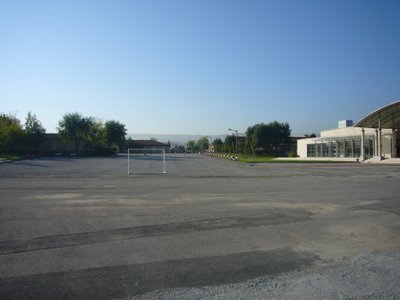
Here is the view of Mara's building (the reddish building just to the right of center) from my school building. The soccer goal seems to be a permanent fixture for recess. Surrounding the entire school is a fence, and we have our own regular guards (why we need them, I don't know).
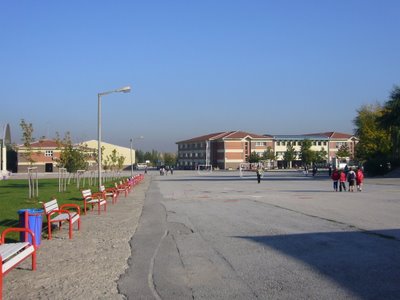
Here is a view of my school building (in the very center), as seen from Mara's building. On the left is the administrative building, just in front of the yellow gymnasium, and on the right are the middle school classrooms.
My school building consists of three floors, and on each floor is a boys and girls bathroom. The second floor is supposed to be for faculty only, but since there are few men in the high school, the male students use it as if it were their own. The other day I came in and found a student shaving in there with shaving cream and a disposable razor. He was doing a very bad job of it, and had nicked himself quite a bit. There were spots of blood all over his face, and his white dress shirt was splattered with blood. Yet he proudly said "good morning" to show me his English skills.
Some mornings I get to walk Mara to class (all of 100 yards across the paved "quad" to the first grade building). Since we take the teacher shuttle in, we arrive before most of her classmates (early students draw on the board while they wait for the teacher). When I leave her building, I am greeted by the sound of 100 rumbling, rolling backpacks (wheeled packs that are popular now, resembling small airport tagalong luggage). And then it's back to my school building, though I only have one first period class a week.
I brought my camera in to take a picture of Muhamet, but he IS OFF FOR HIS COMPULSORY MILITARY SERVICE! Every male takes part in 9 months to a year of service, and I pity little Muhamet - either he'll get ground up and spit out, or everyone will be so charmed by him that he'll have a great experience. He can't weigh more than 135 pounds, is slight of build with glasses. I never even got to thank him. Cenk is still planning trips, though. He showed me a picture of mud-spattered four-wheelers, and I understood his Turkish enough to see he's planning a four-wheeling trip. Count me in.
My school duties include parents night. Unlike my U.S. high school, which schedules a night for parents to get a brief overview of each class, these are run more like the primary school, where individual parents sit and discuss their child for 5-10 minutes. Each "class or level" meets on a different night, and since I have so many classes, I have four parent nights in the next month.
Gul, my department chair, stayed for my first parent night to translate (about 1/5 of the parents spoke good enough English to not need her help). As expected, discussing a parent's child is the same in whatever country you're in - be positive, offer hope, and even when criticizing and/or discussing what the child can do to be a better student, handle the situation delicately. Parents generally said their children enjoy my class, which is nice. Quite strange to have a translator for such a personal discussion, though.
Some mornings I get to walk Mara to class (all of 100 yards across the paved "quad" to the first grade building). Since we take the teacher shuttle in, we arrive before most of her classmates (early students draw on the board while they wait for the teacher). When I leave her building, I am greeted by the sound of 100 rumbling, rolling backpacks (wheeled packs that are popular now, resembling small airport tagalong luggage). And then it's back to my school building, though I only have one first period class a week.
I brought my camera in to take a picture of Muhamet, but he IS OFF FOR HIS COMPULSORY MILITARY SERVICE! Every male takes part in 9 months to a year of service, and I pity little Muhamet - either he'll get ground up and spit out, or everyone will be so charmed by him that he'll have a great experience. He can't weigh more than 135 pounds, is slight of build with glasses. I never even got to thank him. Cenk is still planning trips, though. He showed me a picture of mud-spattered four-wheelers, and I understood his Turkish enough to see he's planning a four-wheeling trip. Count me in.
My school duties include parents night. Unlike my U.S. high school, which schedules a night for parents to get a brief overview of each class, these are run more like the primary school, where individual parents sit and discuss their child for 5-10 minutes. Each "class or level" meets on a different night, and since I have so many classes, I have four parent nights in the next month.
Gul, my department chair, stayed for my first parent night to translate (about 1/5 of the parents spoke good enough English to not need her help). As expected, discussing a parent's child is the same in whatever country you're in - be positive, offer hope, and even when criticizing and/or discussing what the child can do to be a better student, handle the situation delicately. Parents generally said their children enjoy my class, which is nice. Quite strange to have a translator for such a personal discussion, though.
Wednesday, November 01, 2006
I have been very remiss (but also very busy). To get at least something put down in this blog, I am cutting and pasting part of an e-mail Silvia sent to some family members (and was written to send some information, not dazzle you with her customary style). I have her permission, however, to post it. It discusses a little about our children's schooling.
"Yes, we are all doing well. Michael at work, likes it, good colleagues, decent students, and at a top-notch private school. Mara (our seven-year- old) goes along happily with him everyday, in her uniform of blue pleated skirt, pin-striped shirt and choice of red vest or red cardigan. Can you almost see her skipping to school, her skirt following along? She loves the school, even though or perhaps because it is in Turkish, and she's picking it up and figures out what to do at school cuz everyone, students and teachers, give her cues or help or outright English translations! I think she savors all this attention, from her lone time with Papa to and from school, to being the American in a Turkish class of 1st graders.
For Elli Sol (our five-year-old) we also found just what she needed and loves as well. A smaller, private international school where instruction is in English, but Turkish language is a subject and the students are from all around the world, hence not all English-dominant. Her class is tiny, about 13, compared with Mara's 24, the teacher's an Asian American from CA, and the staff there are likewise so helpful and welcoming. Whenever Miguel and I show up to do holiday crafts, I am served tea and snacks and stay too long and get too little crafting done in favor of picking all the fellow-crafter's brains about how-to's, where-to's, what-to's in Ankara. Now Elli Sol likewise wears a uniform, of muted colors, no specific wardrobe, although for ease of mind we got her some jumpers (like tanktop dresses with pleated skirts at bottom which you wear over a blouse or shirt) in blue and grey, plus some white shirts to go underneath. So off she goes romping with her jumper outfit and backback stuffed with snack and lunch, unless she buys lunch (whereas Mara is served a hot Turkish restaurant-like meal of several courses fresh-cooked by chefs in those white uniforms and chef hats). Elli Sol, on the other hand, will buy a pizza slice this Friday. But Elli Sol comes home jumping to tell me about the day's happenings and the letters, and journals and numbers and Turkish and library and computer and art...
Miguel (our three-year-old) needs a school soon. For now he's content tagging along with me all day to playgroups and parks and errands, of which there are many in this bureaucratic land. But brief detachments from me might do us both well. Me? Just trying to keep the household running smoothly, and the inhabitants happy, or at least constructively occupied. (Cash-flow willing, maybe Turkish and German courses in the works, while Miguel at preschool, a tricky mission on public transport too.).
Everyone here, truly everyone, has been wonderful to us, and especially to the children. Here, children are quite openly adored. Ours are just now getting used to complete strangers stroking their heads, hugging them, picking them up, offering them food, in short, loving them. We can send our kids, at least two of them, up the street to buy bread, knowing everyone is watching out for them. Even the breadmaker gives them more bread than the coins they carry should buy, but probably cuz like all other Turks they are thrilled to hear them speak even a word of Turkish, and asking for bread involves at least three, which they know fluently by now: bir ekmek lutfen (one breadloaf please) or, during Ramazan which just ended, bir pide lutfen. Mara and Elli Sol were especially saddened that the fresh, warm, evening pide is no longer available. They will always remember the aroma, the weight (while carrying it home), the taste, the feelings associated with pide during Ramazan. Isn't that great?! And so much else too."
If you're interested in seeing more about their schools, here are some sites:
For Elli Sol, try:
http://www.oasisis.org/schools/ankara.html for general info; it links to school’s web site http://www.icsankara.org/
For Mara’s school, where she’s in 1st grade (and immersed in Turkish!): http://www.odtugvo.k12.tr/
"Yes, we are all doing well. Michael at work, likes it, good colleagues, decent students, and at a top-notch private school. Mara (our seven-year- old) goes along happily with him everyday, in her uniform of blue pleated skirt, pin-striped shirt and choice of red vest or red cardigan. Can you almost see her skipping to school, her skirt following along? She loves the school, even though or perhaps because it is in Turkish, and she's picking it up and figures out what to do at school cuz everyone, students and teachers, give her cues or help or outright English translations! I think she savors all this attention, from her lone time with Papa to and from school, to being the American in a Turkish class of 1st graders.
For Elli Sol (our five-year-old) we also found just what she needed and loves as well. A smaller, private international school where instruction is in English, but Turkish language is a subject and the students are from all around the world, hence not all English-dominant. Her class is tiny, about 13, compared with Mara's 24, the teacher's an Asian American from CA, and the staff there are likewise so helpful and welcoming. Whenever Miguel and I show up to do holiday crafts, I am served tea and snacks and stay too long and get too little crafting done in favor of picking all the fellow-crafter's brains about how-to's, where-to's, what-to's in Ankara. Now Elli Sol likewise wears a uniform, of muted colors, no specific wardrobe, although for ease of mind we got her some jumpers (like tanktop dresses with pleated skirts at bottom which you wear over a blouse or shirt) in blue and grey, plus some white shirts to go underneath. So off she goes romping with her jumper outfit and backback stuffed with snack and lunch, unless she buys lunch (whereas Mara is served a hot Turkish restaurant-like meal of several courses fresh-cooked by chefs in those white uniforms and chef hats). Elli Sol, on the other hand, will buy a pizza slice this Friday. But Elli Sol comes home jumping to tell me about the day's happenings and the letters, and journals and numbers and Turkish and library and computer and art...
Miguel (our three-year-old) needs a school soon. For now he's content tagging along with me all day to playgroups and parks and errands, of which there are many in this bureaucratic land. But brief detachments from me might do us both well. Me? Just trying to keep the household running smoothly, and the inhabitants happy, or at least constructively occupied. (Cash-flow willing, maybe Turkish and German courses in the works, while Miguel at preschool, a tricky mission on public transport too.).
Everyone here, truly everyone, has been wonderful to us, and especially to the children. Here, children are quite openly adored. Ours are just now getting used to complete strangers stroking their heads, hugging them, picking them up, offering them food, in short, loving them. We can send our kids, at least two of them, up the street to buy bread, knowing everyone is watching out for them. Even the breadmaker gives them more bread than the coins they carry should buy, but probably cuz like all other Turks they are thrilled to hear them speak even a word of Turkish, and asking for bread involves at least three, which they know fluently by now: bir ekmek lutfen (one breadloaf please) or, during Ramazan which just ended, bir pide lutfen. Mara and Elli Sol were especially saddened that the fresh, warm, evening pide is no longer available. They will always remember the aroma, the weight (while carrying it home), the taste, the feelings associated with pide during Ramazan. Isn't that great?! And so much else too."
If you're interested in seeing more about their schools, here are some sites:
For Elli Sol, try:
http://www.oasisis.org/schools/ankara.html for general info; it links to school’s web site http://www.icsankara.org/
For Mara’s school, where she’s in 1st grade (and immersed in Turkish!): http://www.odtugvo.k12.tr/
